|
|
|
Sort Order |
|
|
|
Items / Page
|
|
|
|
|
|
|
| Srl | Item |
| 1 |
ID:
117464
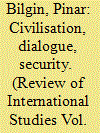

|
|
|
|
|
| Publication |
2012.
|
| Summary/Abstract |
The purposes of this article are twofold: (1) to consider the extent to which Dialogue of Civilisations (DoC) initiatives, as alternative visions of post-secular world order, are likely to address insecurities that they identify; and (2) to point to other insecurities that are likely to remain unidentified and unaddressed in the process. In their present conception, DoC initiatives risk falling short of addressing the very insecurities they prioritise (the stability of inter-state order) let alone attending to those experienced by non-state referents, which they overlook. The article advances three points in three steps. First, I point to how projects of civilisational dialogue have bracketed civilisation, thereby leaving intact the Huntingtonian notion of civilisations as religiously unified autochthonous entities. Second, I argue that while contributing to opening up space for communication, DoC initiatives have nevertheless failed to employ a dialogical approach to dialogue between civilisations. Third, I tease out the notion of security underpinning DoC initiatives and argue that the proponents DoC, in their haste to avert a clash, have defined security narrowly as the absence of war between states belonging to different civilisations. Theirs is also a shallow notion of security insofar as it fails to capture the derivative character of security and insecurity.
|
|
|
|
|
|
|
|
|
|
|
|
|
|
|
|
| 2 |
ID:
074393


|
|
|
| 3 |
ID:
145125
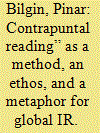

|
|
|
|
|
| Summary/Abstract |
How to approach Global International Relations (IR)? This is a question asked by students of IR who recognize the limits of our field while expressing their concern that those who strive for a Global IR have been less-than-clear about the “how to?” question. In this article, I point to Edward W. Said’s approach to “contrapuntal reading” as one way of approaching Global IR that embraces diversity and reflects multiple and overlapping experiences and perspectives of humankind. More specifically, I suggest that contrapuntal reading offers students of IR a method of studying world politics that focuses on our “intertwined and overlapping histories,” past and present; an ethos for approaching IR through raising the “contrapuntal awareness” of its students and offering an anchor for those who translate the findings of different perspectives; and a metaphor for thinking about Global IR as regional and global, one and many.
|
|
|
|
|
|
|
|
|
|
|
|
|
|
|
|
| 4 |
ID:
153940
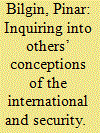

|
|
|
| 5 |
ID:
189108
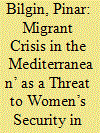

|
|
|
|
|
| Summary/Abstract |
The decentring agenda in European Studies has called for turning our gaze from the ‘centre’ towards the ‘periphery’. This essay offers one decentred approach to EU migration governance in the Mediterranean: Studying geopolitical encounters between the receiving and sending spaces as constitutive of the very issues that are otherwise portrayed as autonomously developed. I will do this by adopting Edward Said’s method of contrapuntal reading, which involves ‘thinking through and interpreting together’ narratives from different parts of the world towards recovering ‘intertwined and overlapping histories’ of humankind. The specific case I look at is the 2015 ‘migrant crisis in the Mediterranean’ and the ways in which women’s insecurities were portrayed. While such representations presume women’s insecurities to have developed in the South/east and arrived in the North/west via migration, a contrapuntal reading of Fatima Mernissi’s writings together with everyday portrayals of the ‘crisis’ points to the connectedness of otherwise differentiated experiences. What is represented as ‘before Europe’ (in Bernard McGrane's felicitous turn of phrase) is, at the same time, the ‘aftermath of Europe’ insofar as geopolitical encounters between North/west and South/east of the Mediterranean have been constitutive of women’s insecurities.
|
|
|
|
|
|
|
|
|
|
|
|
|
|
|
|
| 6 |
ID:
109592
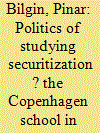

|
|
|
|
|
| Publication |
2011.
|
| Summary/Abstract |
Copenhagen School securitization theory has made significant inroads into the study of security in Western Europe. In recent years, it has also begun to gain a presence elsewhere. This is somewhat unanticipated. Given the worldwide prevalence of mainstream approaches to security, the nature of peripheral international relations, and the Western European origins and focus of the theory, there is no obvious reason to expect securitization theory to have a significant presence outside Western Europe. Adopting a reflexive notion of theory allows, the article argues, inquiry into the politics of studying security, which in turn reveals how the Western European origins and focus of securitization theory may be a factor enhancing its potential for adoption by others depending on the historico-political context. Focusing on the case of Turkey, the article locates the security literature of that country in the context of debates on accession to the European Union and highlights how securitization theory is utilized by Turkey's authors as a 'Western European approach' to security.
|
|
|
|
|
|
|
|
|
|
|
|
|
|
|
|
| 7 |
ID:
054125
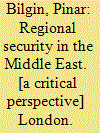

|
|
|
|
|
| Publication |
London, routledgeCurzon, 2004.
|
| Description |
viii, 246p.
|
| Series |
RoutledgeCurzon advances in Middle East and Islamic studies
|
| Standard Number |
0415325498
|
|
|
|
|
|
|
|
|
|
|
|
Copies: C:1/I:0,R:0,Q:0
Circulation
| Accession# | Call# | Current Location | Status | Policy | Location |
| 048695 | 355.033056/BIL 048695 | Main | On Shelf | General | |
|
|
|
|
| 8 |
ID:
052098
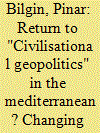

|
|
|
|
|
| Publication |
Summer 2004.
|
| Summary/Abstract |
The prevalence of the discourse of ideological geopolitics during the Cold War meant that both Turkey and the EU belonged to the West by virtue of their ideological orientation. In the absence of this prevalent geopolitical discourse, both the EU and Turkey have spent the 1990s trying to locate themselves geographically. Drawing on the literature on critical approaches to political geography and international relations, this article seeks to answer the question of whether the EU's post-Cold War security discourse on the Mediterranean in general and on relations with Turkey in particular point to a return to the earlier discourse of civilisational geopolitics. The article also presents a reading of Turkish policy makers' attempts to resist EU's representation of Turkey in 'non-Europe' (as with the 'Middle East' or the 'Mediterranean') as boundary-producing practices which have served to underline the boundaries between the 'West' and the 'non-West'.
|
|
|
|
|
|
|
|
|
|
|
|
|
|
|
|
| 9 |
ID:
142565
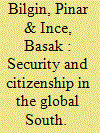

|
|
|
|
|
| Summary/Abstract |
The relationship between security and citizenship is more complex than media portrayals based on binary oppositions seem to suggest (included/excluded, security/insecurity), or mainstream approaches to International Relations (IR) and security seem to acknowledge. This is particularly the case in the post-imperial and/or postcolonial contexts of global South where the transition of people from subjecthood to citizenship is better understood as a process of in/securing. For, people were secured domestically as they became citizens with access to a regime of rights and duties. People were also secured internationally as citizens of newly independent ‘nation-states’ who were protected against interventions and/or ‘indirect rule’ by the (European) International Society, whose practices were often justified on grounds of the former’s ‘failings’ in meeting the so-called ‘standards of civilization’. Yet, people were also rendered insecure as they sought to approximate and/or resist the citizen imaginaries of the newly established ‘nation-states’. The article illustrates this argument by looking at the case of Turkey in the early Republican era (1923–1946).
|
|
|
|
|
|
|
|
|
|
|
|
|
|
|
|
| 10 |
ID:
085435
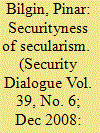

|
|
|
|
|
| Publication |
2008.
|
| Summary/Abstract |
Secularism is frequently portrayed as a security referent in present-day Turkey. But, what is it that makes secularism a security issue? Where are we to locate the `securityness' of secularism? Against prevailing accounts that privilege the domestic dimension, this article argues that the securityness of secularism in Turkey should be located in both the domestic and the international. This is not to suggest that secularism can be reduced to security, but it is to suggest that efforts to portray Turkey's secularism merely as a constitutive principle and an outcome of the project of Republican transformation, or as a means of safeguarding a particular vision of transformation through controlling religion, or as an instrument of national economic development, while rewarding in themselves, nevertheless miss an important set of dynamics that help to explain secularism's centrality to Turkey's politics.
|
|
|
|
|
|
|
|
|
|
|
|
|
|
|
|
| 11 |
ID:
095591
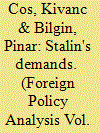

|
|
|
|
|
| Publication |
2010.
|
| Summary/Abstract |
Standard accounts on Turkey's foreign policy identify Molotov's communication of 1945 (better known as "Stalin's demands") as the catalyst behind Turkey's post-WWII decision to strain its relations with the USSR and turn to the United States (US) for defense support. The aim here is to complement these accounts which have stressed the military and ideological threat posed by the USSR as the catalyst behind Turkey's foreign policy change, by offering an analysis that explores the conditions of possibility for such change. The aim here is not to question the seriousness of the risks involved in failing to stand firm against the USSR in the immediate post-WWII period. Nor is it to dispute the appropriateness of Turkey's search for "Western" allies at a time when its economic, political and military vulnerabilities were acknowledged by friend and foe alike. The following mediates through accounts that stress the military threat and those that emphasize the ideological threat and presents an analysis that looks into the production of representations of the USSR as a "threat" to Turkey and the context which allowed for the production of such representations of the USSR.
|
|
|
|
|
|
|
|
|
|
|
|
|
|
|
|
| 12 |
ID:
081211
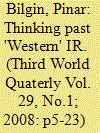

|
|
|
|
|
| Publication |
2008.
|
| Summary/Abstract |
The laudable attempts at thinking past 'Western'ir should not limit their task to looking beyond the spatial confines of the 'West' in search for insight understood as 'difference', but also ask awkward questions about the 'Westernness' of ostensibly 'Western' approaches to world politics and the 'non-Westernness' of others. For there may be elements of 'non-Western' experiences and ideas built in to 'Western' ways of thinking about and doing world politics. The reverse may also be true. What we think of as 'non-Western' approaches to world politics may be suffused with 'Western' concepts and theories. Indeed, those who are interested in thinking past 'Western'ir should take an additional step and inquire into the evolution of the latter. While looking beyond the 'West' may not always involve discovering something that is radically 'different' from one's own ways of thinking about and doing world politics, such seeming absence of 'difference' cannot be explained away through invoking assumptions of 'teleological Westernisation', but requires becoming curious about the effects of the historical relationship between the 'West' and the 'non-West' in the emergence of ways of thinking and doing that are-in Bhabha's words-'almost the same but not quite'. This article looks at three such instances (India's search for nuclear power status, Turkey's turn to secularism, and Asia's integration into the liberal world order) in the attempt to illustrate how 'mimicry' may emerge as a way of 'doing' world politics in a seemingly 'similar' yet unexpectedly 'different' way.
|
|
|
|
|
|
|
|
|
|
|
|
|
|
|
|
| 13 |
ID:
101479
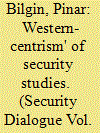

|
|
|
|
|
| Publication |
2010.
|
| Summary/Abstract |
Unlike some other staples of security studies that do not even register the issue, Buzan & Hansen's (2009) The Evolution of International Security Studies unambiguously identifies 'Western-centrism' as a problem. This article seeks to make the point, however, that treating heretofore-understudied insecurities (such as those experienced in the non-West) as a 'blind spot' of the discipline may prevent us from fully recognizing the ways in which such 'historical absences' have been constitutive of security both in theory and in practice. Put differently, the discipline's 'Western-centric' character is no mere challenge for students of security studies. The 'historical absence' from security studies of non-Western insecurities and approaches has been a 'constitutive practice' that has shaped (and continues to shape) both the discipline and subjects and objects of security in different parts of the world.
|
|
|
|
|
|
|
|
|
|
|
|
|
|
|
|
| 14 |
ID:
051560
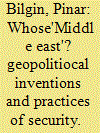

|
|
|
|
|
|
|
|